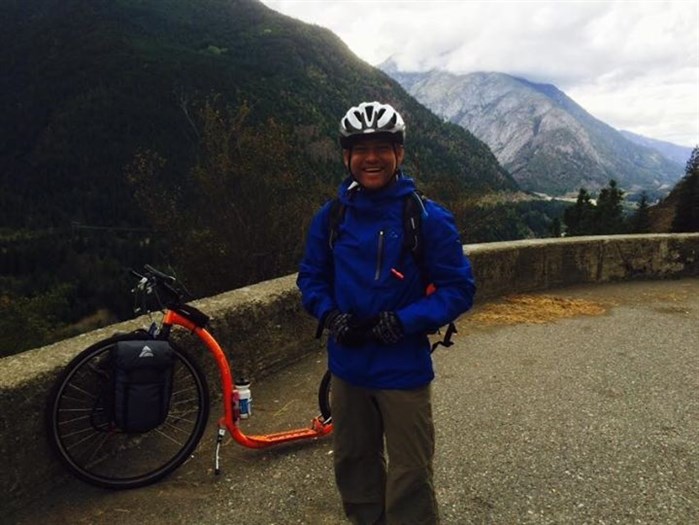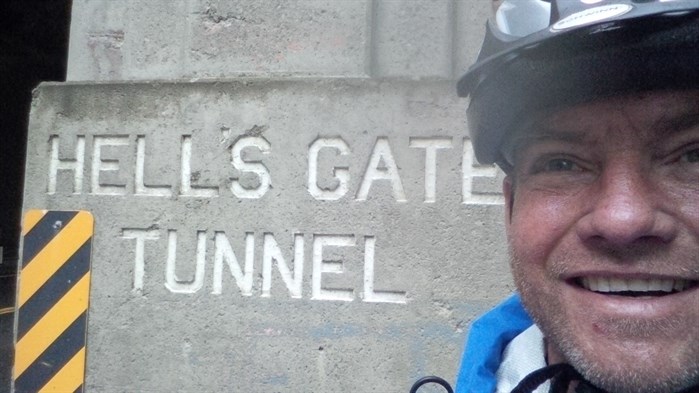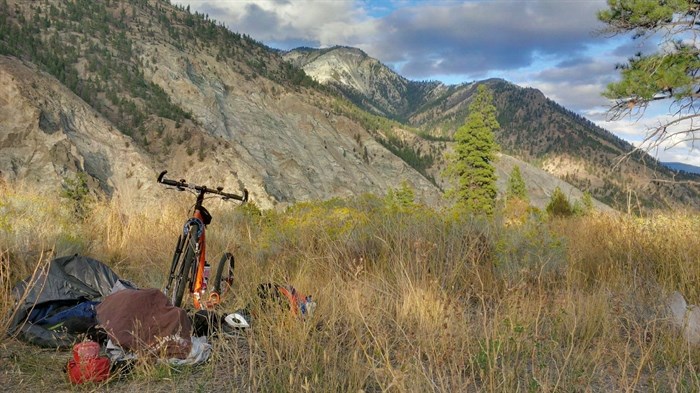
Hal Bennett and his kick-bike
Image Credit: Hal Bennett/Facebook
November 28, 2015 - 9:30 AM
KAMLOOPS – Hal Bennett shouldn’t be alive.
For years, he ignored his own diabetes and destroyed his kidneys with decades of alcohol, heroin and cocaine abuse. At one time, he couldn’t even stay clean long enough to save his own life and remain eligible for a transplant.
But this fall, with nearly four years’ sobriety, clean health and a successful transplant, Bennett, 44, sought a way to celebrate and honour his donor and his own journey back from certain death.
And he nearly tripped over it. He had been stepping over an unused kick-bike he kept in his tiny bachelor apartment for some reason and finally found a way to use it.
“I sat down and looked at the bike. ‘What am I going to do with you?’" he says. “‘You’re going to take me to Vancouver.’”
Lots of people have ridden bicycles to Vancouver. But if you aren’t familiar, a kick-bike is a very poor cousin; it has a front tire like a bike, but the rest is all scooter.
Nothing about his journey would be easy.
*
Bennett was never much of a stranger to alcohol and drugs. He started young, as a teenager. He found a way to step outside of himself and preferred it there. First he was a weekend warrior, binging on his off-days.
By the time he was 31, there were no more weekends. When his wife left him, it was all down hill. Before long he was lost, using and dealing heroin, crack, cocaine.
“I thought I was doing okay but my thought processes in my head were ‘okay, how do we get back to using again? How do we get back to flying off the handle again’?” he says. “I’m not proud of it but, you know, I’m not going to deny it either. My addiction was what it was.”
*
He spent his entire summer preparing for the journey. Each paycheque would buy a few more supplies, a little more gear. By September, he knew if he was going to go, it had to be soon. It was getting cooler and darker with each night.
But after paying some unexpected bills, he had nothing left to travel with. Bennett wasn’t sure he would be able to afford the trip until he got a nudge from the Kamloops outreach group, ASK Wellness.
“They said, ‘you know what, we heard about what you’re doing. Here’s $100 for your return bus fare,’” Bennett says.
“Everything just fell into place.”
*
Four years ago, Bennett saw the end coming. As a diabetic, he was already at risk for kidney disease. The drugs and booze just hastened it. He'd never get a transplant until he was clean and, until then, had no choice but to receive dialysis.
But even that didn’t stop his habits. He remembers overdosing and being brought back from the brink of death at Royal Inland Hospital in Kamloops.
“My heart actually did stop. And I remember the out-of-body experience I had with that,” he says. “I remember being there and I remember being alert but I couldn’t move. I couldn’t turn, I couldn’t sit up, I couldn’t move. Apparently at that point they thought I had already passed.”
Doctors told him later they didn’t save him; he did that on his own. He remembers that.
*
The first leg of his trip was by far the worst. He chose the Trans-Canada Highway and by the time he reached Cache Creek, he was so cold he knew he had to make a decision. Heading south would be tougher than he imagined. This was his chance to take the easier road back to Kamloops.
“I thought okay. This is the time you either turn around and go home or you keep going,’” Bennett says.
He made the commitment and pushed on through mountain passes, Hells Gate, torrential downpours near Yale and finally to Chilliwack.
It took him six days.

Image Credit: Hal Bennett/Facebook
*
While some addicts have an awakening, hit ‘rock bottom’ or some major event forces them to re-evaluate their lives, it was never like that for Bennett. He says he got continual “nudges up the mountain” before he was able to quit drugs and alcohol for good.
In an attempt to hold onto a failing relationship, he accompanied his then-girlfriend to 12-step meetings. Bennett admits he only went because at the time he had nowhere else to go. And the meetings had free coffee.
“Eventually some of this (12-step) stuff started sticking,” he says. “That first year was brutal. You’re looking at yourself, not only are you trying to find all the good stuff, you’ve got to look through all that stuff you’ve put in the back.”
He describes it like removing layers of clothing to figure out who he really was underneath.
“The one I hated the most (in recovery) was ‘we’ll love you until you love yourself,’” he says.
*
Though he doesn’t name his God, Bennett says he felt “looked after” along the road. He refers to himself as a vessel, part of a plan that is meant to be. There always seemed to be a nudge when he needed it.
Once, a man who owned a small camp site allowed him to stay the night for free.
“I laid all my gear out on the picnic table so I had a place to cook, cut my food and just arrange everything. I had a nice, warm shower and internet. He just let me tie into his house internet,” Bennett laughs. “There was always something. It was always right when I needed it. The less I worried and had to think about it, the easier this stuff came. It was very reassuring.”
From Chilliwack, Bennett travelled on to Vancouver and toured around the city for a day, having reached his goal. Then a friend in Nanaimo invited him to visit and he thought since he’d gone this far, why not? He boarded the ferry and kick-biked his way to Nanaimo.
“There was some real gratification,” he says. “I feel proud I was a part of it.”
*
After roughly three years clean and sober, he got his transplant surgery in January, 2015. The surgery was in Vancouver, within reach of many of his old haunts.
For the first time, he was able to visit them without feeling shame. The painful, even traumatic, events of his past are now “just stories.”
He’s still figuring out why he hated that line from recovery so much but he’s figured out enough to keep himself on the road that was meant for him.
“After four years I’m really starting to feel okay with myself.”

Image Credit: Hal Bennett/Facebook
To contact a reporter for this story, email Dana Reynolds at dreynolds@infonews.ca or call 250-819-6089. To contact an editor, email mjones@infonews.ca or call 250-718-2724.
News from © iNFOnews, 2015